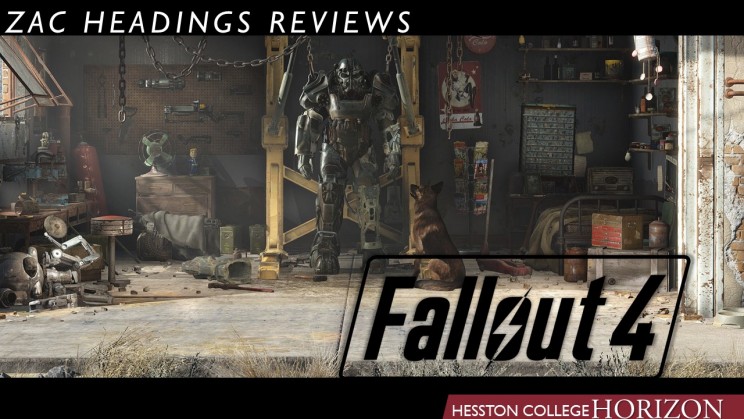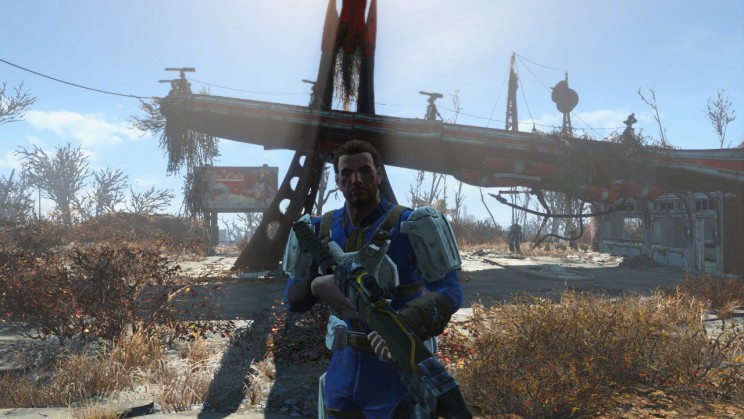Returning to the Wasteland with “Fallout 4”

Zachary Headings – Horizon Reviews
On Nov. 10, 2015, one of the most anticipated video games of all time, “Fallout 4” was released by Bethesda Softworks. Since the release of “Fallout 3” in 2008 and “Fallout: New Vegas” in 2010, the gaming community eagerly awaited word from Bethesda Softworks on the next installment of the beloved role-playing game (RPG) series.
During those four and a half years, speculation and hoaxes lead to both anticipation and disappointment. On June 2, 2015, a countdown timer appeared on Bethesda Softworks’ website, set to expire the next day. The Fallout fan-base waited with bated breath. The next day, the reveal trailer for “Fallout 4” appeared on the website, and the hype began anew.
“Fallout 4” takes place in the year 2287, in a post apocalyptic version of Boston, Massachusetts: The Commonwealth. However, the game begins on Oct. 23, 2077, the morning before the United States of America and the People’s Republic of China wage a two-minute war that results in the world being destroyed in total nuclear armageddon.
The player can play as either a husband or a wife living in a small, gated community northwest of Boston proper called Sanctuary Hills. The player receives the news that nuclear blasts have been sighted in Pittsburgh and New York City, and evacuates their family, including an infant son, to the local Vault-Tec facility, Vault 111. The seemingly benevolent vault turns out to be a cryogenic storage facility, and the player, their spouse, and infant child are all frozen in pods.
After a few events that I will not disclose for fear of spoiling the plot of the game, the player emerges from the vault on Oct. 23, 2877 into a Commonwealth that has been ravaged by time and nuclear fire. The adventure truly begins then as the player sets off into Boston, searching for the things that they have lost
.
“Fallout 4” has both been exciting and disappointing for me. In the previous “Fallout” installments, the player makes choices that genuinely affect the ending of the game. This is also true in “4,” but all of the possible endings are too similar.
One can also apply the same sentiment and frustration to the individual quests. In “Fallout 3” and “New Vegas,” the quests had five or six different ways that they could end and nine or 10 ways that you could complete them. In “Fallout 4,” there are two or three different ways to do a quest and only one outcome. The “dumbing down” of the quest lines and end-games took away a lot of the role-playing aspects of the game.
With all of that in mind, I would still like to say that “Fallout 4” is a fantastic game. The graphics are stunning on any gaming platform. The soundtrack, written by Inon Zur (“Fallout 3,” “Crysis”), is incredible and adds a darker, anti-heroic feeling to the atmosphere of the game. The new gameplay mechanics that were added since “New Vegas,” such as extensive weapon and armor modding, drivable power armor, and settlement-building, bring a new dimension of gameplay to the already expansive game.
One new feature of “Fallout 4” that I would specifically like to comment on is the new multi-level gamespace. In “Fallout 3” and “New Vegas,” the gameplay was all basically one level, meaning that you could not leave the ground with the exception of going into a building. “Fallout 4” adds a whole new, three-dimensional atmosphere with the addition of patrolling Vertibirds (helicopters) and jet-packs, as well as opening up the roofs of buildings for gameplay.
A fantastic aspect of Bethesda Softworks games is that the developers release the Creation Kit, a user-friendly version of the program they use to make the game, for the PC platform. With this, gaming community members can design their own weapons, armor, and even buildings. This material is generally referred to as “mods,” short for modifications. Many “modders” have gone as far as to create new playable quests and landscapes. In the past, mods have only been available to PC gamers. With the release of “Fallout 4,” Bethesda has been working with PlayStation Network and XBox Live to bring mods to the console systems.
All in all, “Fallout 4” is a great next installment in the “Fallout” franchise. It does fall into an action-adventure genre more than it does a role-playing game, but many elements of the traditional RPG’s are still there. With the modding community hard at work to improve on Bethesda’s already great game, “Fallout 4” should remain very high on the charts for a long while.
Author’s note: I am looking for material to review! Send me suggestions of movies, TV shows, video games, and more. Send suggestions to zac.headings@hesston.edu under the subject line “Review Material Suggestion” or comment here.
About the author: Zachary Headings is a Sophomore at Hesston College where he is completing an Associates of General Studies. His primary focus is music, but dabbles in other things like writing and astronomy. In his spare time, he watches movies and TV shows, plays video games, and fangirls about anything and everything Star Wars. In the future, he would love to write for a gaming magazine, like IGN or PC Gamer.


